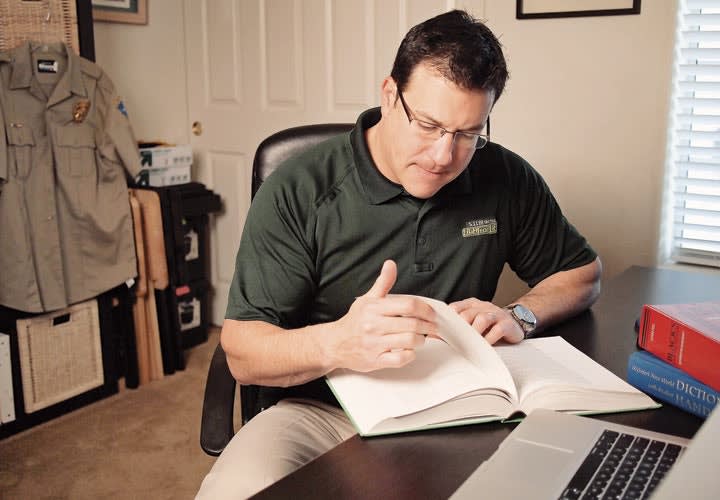A law enforcement officer who is considering the pursuit of a degree through an online university needs to know the answers to the following questions before enrolling.
It's never been easier to get a college degree. Unfortunately, it's never been more expensive to get a college degree.
That means the prospective student is making a major investment in time and money to earn a diploma. And as with any investment, return on that money is in no way guaranteed.
A law enforcement officer who is considering the pursuit of a degree through an online university needs to know the answers to the following questions before enrolling. Knowing these things in advance will help you determine if online education is right for you, help you successfully complete the program, and give you a better chance of achieving your career goals through education.
1. Why Do I Want This Degree?
There are several issues to consider under this question. If your goal is promotion within your department, you need to make sure that the program you are considering is accepted by your agency. If your goal is to establish a second career, talk to people in that field and ask them if they think this degree will help you achieve that goal. Unless you are going to school just for your own edification, focus on what you want to do with the degree and make sure it will give you a leg up before spending your money.
2. Does Online Education Fit You and Your Schedule?
Don't think for a minute that online classes are easier. Most students find them to be as challenging as, if not more challenging than, traditional classes. "Online is not for everybody," says Gregory Allen, director of the security management department at Bellevue University. "It's a good alternative to in-class for police officers, but it's not easy." You need to be really disciplined to succeed in these programs. You also need to make sure that you have the time for them. You are going to have to put in the hours. Some students think they will breeze right through these programs with very little time commitment. Don't tell yourself that lie. You are about to sacrifice most of your free time to this program. There's a reason why the graduate criminology program offered by California University of Pennsylvania limits students to two courses per term. "We don't want them to be overwhelmed," says Professor Aref Al Khattar.
3. Is This School Being Straight With You?
Jeff Kuhn, director of public safety outreach for American Military University, calls this "transparency." You're a cop, you have a strong sense of when someone is BSing you. Make sure that sense is honed and engaged when talking to colleges. Also, speak with fellow officers who have experience with your prospective school and ask them what they think before signing up. You can easily accomplish this on Facebook. "The majority of our students come to us because of word-of-mouth referrals from other people in their fields," says Kuhn.
4. Is This School Accredited?
You want your prospective alma mater to be regionally accredited, not nationally accredited. Regional accreditation means the classes and faculty have been vetted by a regional office of the Council for Higher Education Accreditation and found to meet standards. This is very important if you want to take your 4.0 bachelor's degree from Online University and apply for a graduate program at another school. Even if you think a bachelor's degree is the end of your higher education, choose a regionally accredited university. You will get a quality education that will serve you better than some diploma mill.
5. How Much Will It Cost?
It's not going to be cheap; you can bet the farm on that. Make sure that you know how much it's going to cost before you enroll. Also, know the refund policies and ask if you can pay as you go. These can be very important for police officers who may be injured on the job or assigned to a special detail that will force them to delay their educational aspirations.[PAGEBREAK]
6. Are There Additional Fees?
At most schools, there will be additional fees above tuition. Books are covered by tuition at some schools. At others you have to buy them separately. Either way, you will pay for them. Whatever you think books will cost, double it and you'll be in the ballpark. Some schools also charge lab fees, application fees, transfer credit fees, and even diploma fees. Ask about these fees before you sign up.
7. How Will I Pay for This?
Some of you have tuition reimbursement programs at your agency. Consider yourselves blessed. Others will have to float loans from the government. Either way, make sure that your school is eligible for Federal Student Aid under Title IV. If it isn't, then beware. That means the feds don't trust it enough to grant loans to its students.
8. Who Will Be Teaching Me?
One of the great things about the criminal justice and security faculty at online schools is they tend to be former law enforcement professionals, including prosecutors, cops, and judges. The bad thing is that sometimes these folks aren't great teachers. You want to know who will be teaching you, but you also want to know what kind of teacher training they have received. You also want to know if the faculty is full-time or part-time, according to Jim Lee, associate professor of criminal justice at Troy University. "I believe you see more dedication to student achievement from full-time faculty," Lee explains.
9. Are the Class Hours Flexible?
Your schedule is complicated. If you work a special unit like homicide or SWAT, you could be called to work at any time of day. That's why so many officers like the idea of online education. They can complete their course work at any time during the week. But that's not true at all online schools. Make sure that your classes won't meet at a specific time each week. Most have a requirement that you participate in discussion sections say four times a week. You want one that doesn't care if you login at 1 a.m. Sunday or 6 p.m. Tuesday, just as long as you login.
10. Can I Get Credit for My Professional Training?
The short answer is-probably. Most online universities grant limited elective credit for your academy training or special training such as SWAT school. But check before you enroll. Note: They will charge you a fee to process these credits. So ask about that, too.[PAGEBREAK]
11. What Is the Quality of the Curriculum?
You want to see a strong variety of courses in your given field. Can you specialize in different aspects of your field of study? Do some research and find out.
12. Do I Have to Partner With Other Students on Class Projects?
Hell is other people. This is especially true when your grade depends on people who don't care as much about your grade as you do. Just about every college graduate has had the experience of getting partnered with a slacker. In an online education program, you may get partnered with someone five time zones away, who may or may not be a slacker. Avoid partners, if at all possible.
13. Who Can Proctor Your Exams?
Some online education programs require exams to be proctored. This prevents cheating, and it gives the student someone to ask questions about the test. Find out who is eligible to proctor your exams. Will you have to pay for proctoring? If so, how much? How often?
14. Is the University's Software User-Friendly?
Just about everyone who has ever earned a college degree can tell you horror stories of professors who didn't speak English. The online equivalent of this is educational software that's difficult to use. Ask if you can try it out. You're going to be living with it for the next four years or more so make sure you can live with it.
15. Does the School Offer Tech Support?
You are taking your courses online. That means that sometimes your computer will figuratively stick its tongue out at you and say, "Not today, chump." Like computers are prone to do. When that happens and you've got a paper due in the next hour, you're going to need help. Look for a school that has 24-hour tech support. "We have the best technical support people," says Franzi Walsh, associate dean of criminal justice for the University of Phoenix. "They are very supportive, and it's nice to call them."
Online Degree Programs:
American Military University
Bellevue University
Bethel University College of Criminal Justice
California Coast University
California University of Pennsylvania
Columbia Southern University
DeSales University
Drexel University Online
Henley-Putnam University
Jones International University
Keiser University
PACE University
Nova Southeastern University
University of Maryland University College
University of Phoenix
Waldorf College












